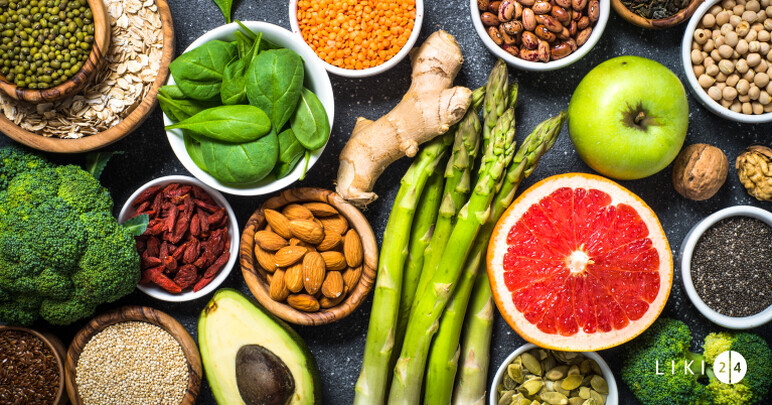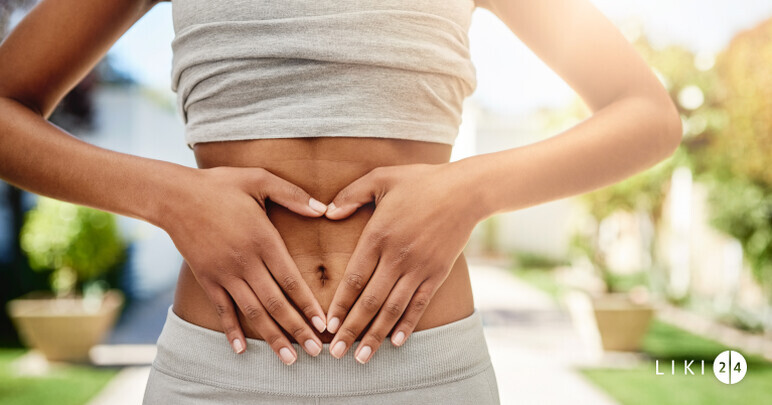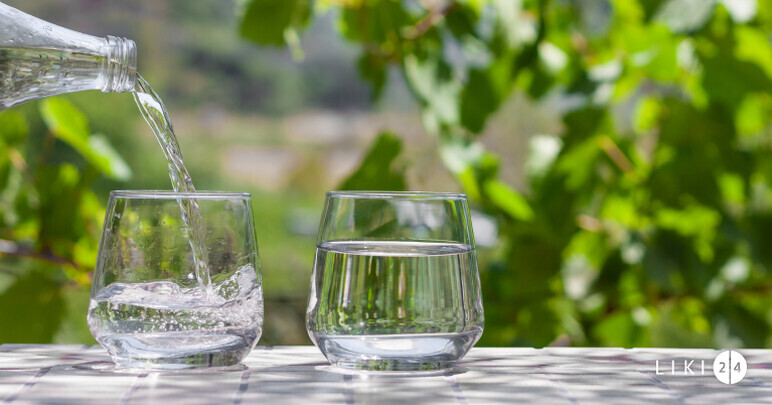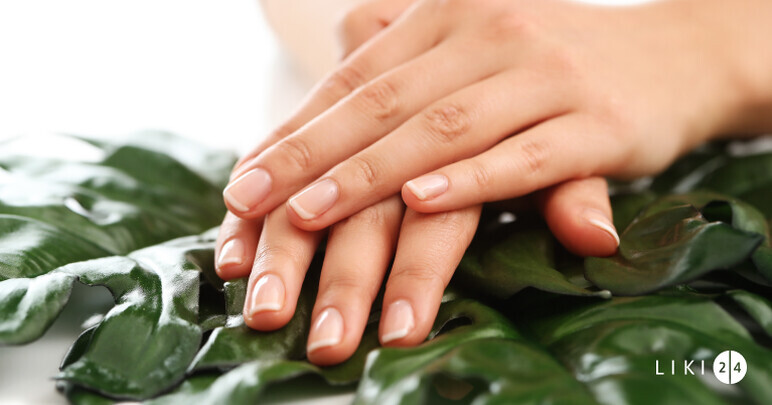Chiasamen

Geheimnisse des zuverlässigen Sonnenschutzes: Wie man die Jugend der Haut erhält


Die Grundlagen einer gesunden Verdauung: Was den Magen gesund hält


Eiweiß beim Muskelaufbau: Lebensmittel mit hohem Proteingehalt, richtige Ernährung

Beschreibung Chiasamen
Die Informationen im Bereich Fragen und Antworten wurden vom Liki24.co.uk-Team erstellt und basieren auf der offiziellen Broschüre des Herstellers.
Chia ist ein essbarer Samen, der von der in Guatemala und Mexiko beheimateten Pflanze Salvia hispanica L. stammt.
"Chia" bedeutet Kraft und die Menschen nutzten diese schwarz-weißen Samen als Energiespender.
Was ist in Chia-Samen enthalten?
Weiße oder schwarze Chiasamen enthalten: Kalzium, Zink, Eisen, Magnesium, Phosphor, Folsäure, Vitamin A, Kupfer, starke Antioxidantien (Kaffeesäure, Chlorogensäure, Kaempferol und Quercetin), Omega-3-Fettsäuren, Fette, Kohlenhydrate, Ballaststoffe und Eiweiß.
Was sind die gesundheitlichen Vorteile von Chiasamen?
Zu den gesundheitlichen Vorteilen gehören:
Bekämpfung freier Radikale
Die in Chiasamen enthaltenen Antioxidantien können dazu beitragen, freie Radikale im Körper zu bekämpfen und so das Risiko von Herzerkrankungen, kognitivem Abbau und bestimmten Krebsarten zu verringern.
Halten Sie Ihr Herz gesund
Chia-Samen enthalten Quercetin, ein Antioxidans, das das Risiko von Herz-Kreislauf-Erkrankungen verringern kann. Chia-Samen enthalten Ballaststoffe, die helfen können, den Blutdruck zu senken und das Risiko von Herzkrankheiten zu verringern.
Aufrechterhaltung eines normalen Blutzuckerspiegels
Chia-Samen sind reich an Ballaststoffen, die die Insulinresistenz verringern und einen normalen Blutzuckerspiegel aufrechterhalten, wodurch das Risiko für das metabolische Syndrom und Typ-2-Diabetes verringert wird.
Reduzierung von Entzündungen
Chronische Entzündungen können Krankheiten wie Herzkrankheiten und Krebs verursachen. Kaffeesäure, ein Antioxidans in Chiasamen, kann helfen, Entzündungen im Körper zu bekämpfen.
Halten Sie Ihre Knochen gesund
Chiasamen enthalten Magnesium, Phosphor, aber auch Kalzium, das eine wichtige Rolle für die gesunde Funktion von Knochen, Muskeln und Nerven spielt. Chia-Samen enthalten mehr Kalzium als Milchprodukte.
Erhöhung des guten Cholesterins (HDL)
Chiasamen tragen dazu bei, das HDL-Cholesterin (gutes Cholesterin) zu erhöhen und das LDL-Cholesterin (schlechtes Cholesterin) zu senken.
Sie haben auch eine schützende Wirkung auf den Blutfetthaushalt und einen positiven Einfluss auf andere Marker der kardiovaskulären Gesundheit.
Gesundheit des Verdauungssystems erhalten
Eine ballaststoffreiche Ernährung hilft, Verstopfung zu vermeiden und einen gesunden Verdauungstrakt zu erhalten.
Körpergewichtskontrolle
Neben der Förderung der Verdauungsgesundheit können Ballaststoffe dazu beitragen, dass man sich länger satt fühlt. Lebensmittel mit einem hohen Ballaststoffgehalt können hilfreich sein, wenn man versucht, ein normales Gewicht zu erreichen.
Aufrechterhaltung physiologischer Funktionen
Alpha-Linolensäure spielt eine wichtige Rolle bei der Bildung wichtiger biochemischer Verbindungen wie Thromboxane und Leukotriene, die mit zahlreichen physiologischen Funktionen im menschlichen Körper verbunden sind. Omega-3-Fettsäuren können Funktionsstörungen der Kalzium- und Natriumkanäle (die Bluthochdruck verursachen können) blockieren und den parasympathischen Tonus verbessern.
Welche Kontraindikationen können Chiasamen haben?
Bei übermäßigem Verzehr von Chiasamen können Verdauungsprobleme auftreten. Es ist wichtig, dass der Anteil der Chiasamen schrittweise erhöht wird und der Wasserkonsum hoch ist, wenn der Körper nicht an eine regelmäßige Aufnahme von Ballaststoffen gewöhnt ist.
Personen, die Schluckbeschwerden haben, sollten keine getrockneten Chiasamen verzehren.
Personen mit Allergien gegen Sesam und Erdnüsse sollten sich testen lassen, bevor sie Chiasamen in ihren Speiseplan aufnehmen.
Bei Menschen, die wegen Bluthochdruck behandelt werden, können nach dem Verzehr von Chia-Samen Nebenwirkungen auftreten.
Alpha-Liponsäure ist in hohen Dosen in Chiasamen enthalten und kann zu einem erhöhten Risiko für die Entwicklung von Prostatakrebs beitragen.
Kann man Chiasamen während der Schwangerschaft verzehren?
Während der Schwangerschaft fördert der Verzehr von Chiasamen die Entwicklung der Netzhaut und des Gehirns des Fötus. Es ist jedoch notwendig, ärztlichen Rat bezüglich des Verzehrs von Chiasamen während der Schwangerschaft und Stillzeit einzuholen.
Welche Rezepte kann man mit Chiasamen zubereiten?
Chia-Samen können ganz, gemahlen, in Mehl, Öl und Gelform verwendet werden.
Chia kann als Hauptnahrungsmittel verwendet werden, allerdings in begrenzten Mengen: empfohlen wird ein maximaler Verzehr von 48 Gramm pro Tag.
Der milde, nussähnliche Geschmack macht es leicht, Speisen und Getränken hinzuzufügen. Sie können über Müsli, in Soßen, unter Gemüse, Reis- oder Joghurtgerichte gegeben oder in Getränke und Gebäck gemischt werden. Sie können mit Wasser vermischt und zu einem Gel verarbeitet werden.
Aufgrund ihrer hydrophilen Eigenschaften können Chia-Samen als Ersatz für Eier und Fette verwendet werden und können das 12-fache ihres Gewichts an Wasser aufnehmen.
Chiaöl kann nachweislich 25 % des Eies in Kuchen ersetzen.
Das Mischen von Butter mit Chiaöl erhöht den Nährwert von Butter.
CHIA-GEL:4 Esslöffel Chiasamen in eine Tasse Wasser geben, gut vermischen und abdecken. 15-20 Minuten ziehen lassen, bis sich die Konsistenz in eine weiche Gelatine verwandelt und bis zu einer Woche im Kühlschrank aufbewahrt werden kann. Empfohlen für Smoothies und Suppen, um den Nährwert zu erhöhen und eine dickere, befriedigendere Konsistenz zu schaffen.
Chia-Gel kann als Ersatz für Öl oder Eier in Backwaren verwendet werden.
CHIA-SAATEN: 6 Esslöffel Chiasamen in eine Schüssel geben, zwei Tassen Flüssigkeit (Milch oder Fruchtsaft) hinzufügen. Mindestens 15 Minuten in den Kühlschrank stellen. Sie können Nüsse, gehackte frische Früchte oder Zimt hinzufügen.
Eigenschaften
| Kategorie | Diät und Ernährung, Gesundes Essen, Samen und Trockenfrüchte, Samen |
| Marke | Alevia, Bio Natur, DmBio, EcoNatur, Herbal Sana, Maya Gold, Natura Plus, Niavis Bio, Pronat, Rawboost, Republica Bio, Sanovita, Solaris, Spring Markt, Vitally |
Bewertungen
Alle sehenDie durchschnittliche Bewertung ist %s basierend auf %s Bewertungen

Chia-Samen, 500 g, Herbal Sana
Sehr gutes Preis-Leistungs-Verhältnis

Chia-Samen, 100 g, Solaris
Sehr gut zum Frühstück

Chia-Samen, 1 kg, Herbal Sana
Sie sind sehr gut und ich und mein Mann verwenden sie morgens zu Haferflocken und anderen Gerichten. Sie sind gesund für den Körper und ich empfehle sie jedem.

Chia-Samen, 1 Kg, Sanovita
Die Verpackung ist kompakt, beim Umfüllen sind es etwa eineinhalb Liter. Ich habe mich für eine Weile eingedeckt;

Chia-Samen, 100 g, Herbal Sana
Ich esse es in Joghurts natürlich und mit Obst sehr gut

Chia-Samen, 250 g, Econatur
Sehr gutes Produkt. Gutes Preis-Leistungs-Verhältnis

Chia-Samen, 100 g, Solaris
Ich verwende es mit Joghurt für die Verdauung

Chia-Samen, 500 g, Herbal Sana
Sehr gutes Preis-Leistungs-Verhältnis

Chia-Samen, 100 g, Herbal Sana
Ich esse es in Joghurts natürlich und mit Obst sehr gut

Chia-Samen, 100 g, Solaris
Ich verwende es mit Joghurt für die Verdauung

Chia-Samen, 100 g, Solaris
Sehr gut zum Frühstück

Chia-Samen, 500g, Econatur
Empfohlene Hilfe zum Abnehmen Ein gutes Produkt

Chia-Samen, 500 g, Sanovita
Sehr gutes Preis-Leistungs-Verhältnis

Chia-Samen, 1 kg, Herbal Sana
Sie sind sehr gut und ich und mein Mann verwenden sie morgens zu Haferflocken und anderen Gerichten. Sie sind gesund für den Körper und ich empfehle sie jedem.

Chia-Samen, 250 g, Econatur
Sehr gutes Produkt. Gutes Preis-Leistungs-Verhältnis

Chia-Samen, 1 Kg, Sanovita
Die Verpackung ist kompakt, beim Umfüllen sind es etwa eineinhalb Liter. Ich habe mich für eine Weile eingedeckt;
















































